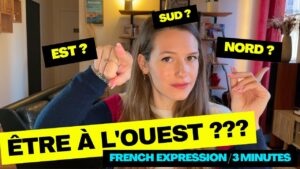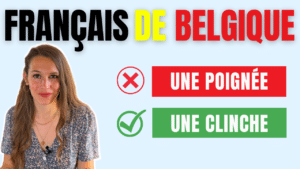Transcript
Hi everyone.
Welcome to another French lesson. Today, we're going to talk about a little word that I know you're having trouble with. Many of you have asked me to make a video on this word, which is "voilà".
It's a word that's used a lot in French and in many different contexts. When you're not a native speaker, it can be really complex to understand the different contexts in which it can be used.
🚀 Transform your understanding of French IN 15 MINUTES A DAY
60 dialogues to boost your understanding of French 🇫🇷
In this video, we'll look together at six contexts in which you can use this word "voilà", and I'll explain exactly what it means in each of these contexts. Before you start, don't forget to support my work by putting a j'aime, you know it's very important to me.
The first meaning of the word voilà is actually a synonym for "tiens", so when you're going to give something to someone. Instead of saying "tiens, le sel", I could say "voilà le sel". So we use it to give something. For example, when I hand someone a book, I might say "here's your book".
Or if someone says, "Can you give me a sheet of paper?", I can answer, "Here you go", holding out the sheet, handing over the paper. Here's the remote control. Voilà is a word we're going to use in a rather everyday context, in a not very formal context.
The second use of voilà is to introduce someone, for example. Voilà Thibault, my friend. Voilà can simply be used instead of c'est in an informal context, in everyday language, to introduce an explanation or to present an object or something.
If you drive past the school where you went to school. Instead of saying "this is the school where I studied", I can say "this is the school where I studied".
This is the dress I want to buy. So here, for example, you're showing a friend the dress you want to buy on the Internet. This is how you turn on the TV, instead of saying, "This is how you turn on the TV with this remote control".
That's why I never drink red wine, I get a red tongue afterwards, that's why I don't do it. That's why I never drink red wine.
A fourth use of the word voilà is a synonym for "since", "there is". Instead of saying il y a cinq ans que j'ai eu mon bac, I could say voilà cinq ans que j'ai eu mon bac. It's been three days since I ate cake and candy.
Instead, I could say I haven't eaten any cakes or sweets for three days. Fifth use, French people can use "voilà" instead of "oui", "c'est exact".
It's used here to confirm something, to validate information, to say that something is correct. For example, in a restaurant, if I order a dessert for two, the waiter might say, "Would you like a dessert and two spoons? Is that right?" I can answer "voilà". To say yes, that's right. And again, it's a pretty informal way of expressing yourself.
Here is a second context.
I get it. You like Michel, but you want him to be the one to tell you first. There, you've got it.
And finally, voilà is very, very, very often used to conclude. When you don't know what to say, when you have nothing more to add, you end by saying "voilà". It's synonymous with "it's over".
We use voilà to show that we've finished, that we've finished talking. We've finished our explanation. What did you do this weekend? I saw a friend, we had coffee. I also went to the movies with another friend. And now I don't want to talk to you anymore. That's that.
And that's it for today, this video is over. I hope you've enjoyed it, and that it's given you a better understanding of the different contexts in which French people can use the word "voilà", and that you too can now use it in all these situations.
That's it, this video is over.
I'll see you soon and don't forget to put a "like".








